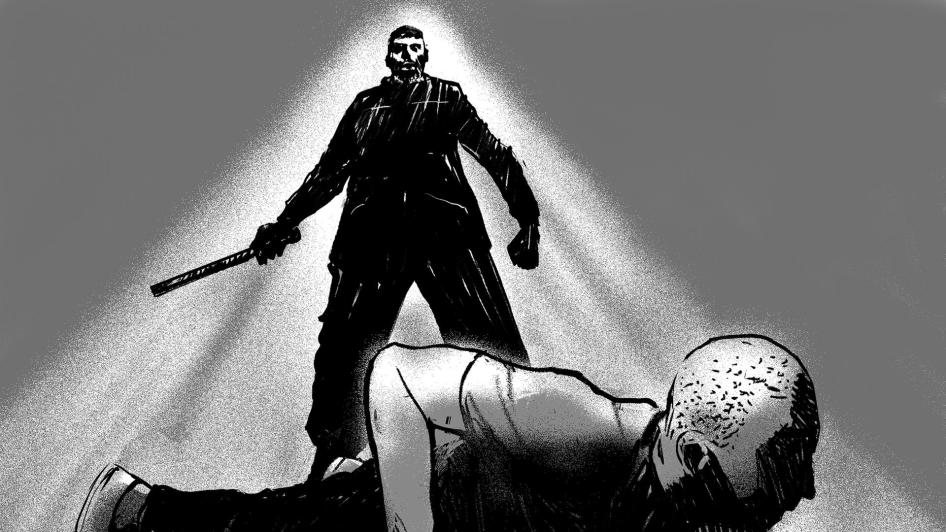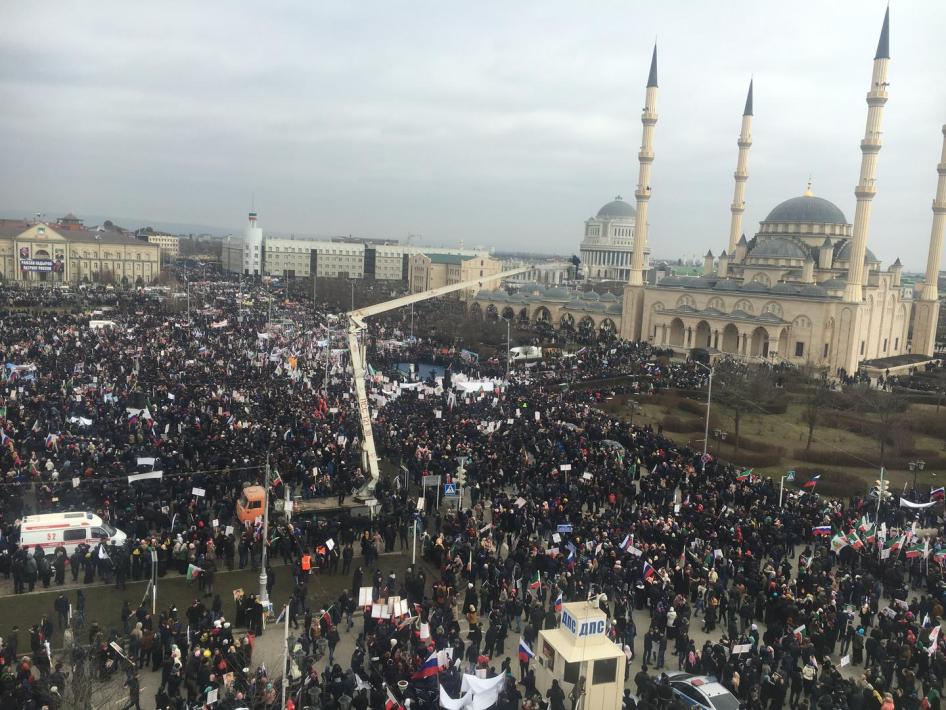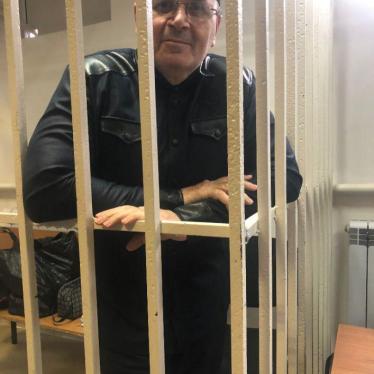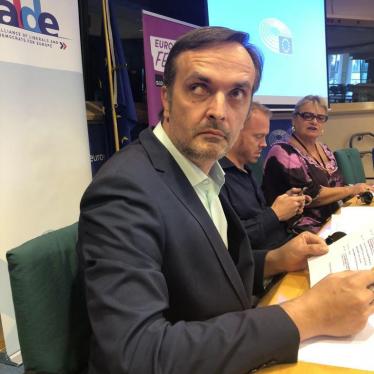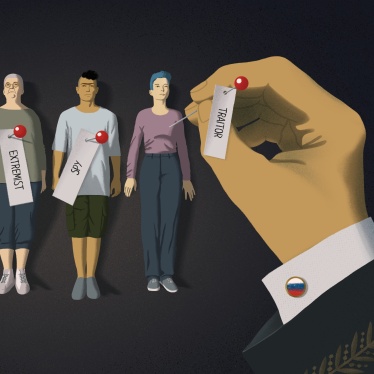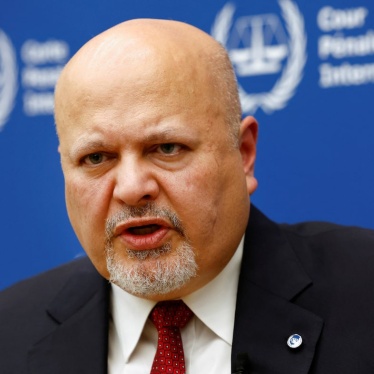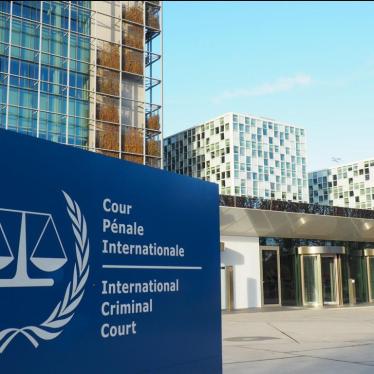(Moscow) – Police in Chechnya have carried out a new round of unlawful detentions, beatings, and humiliation of men they presume to be gay or bisexual, Human Rights Watch said today. The new abuses come against a backdrop of absolute impunity for the vicious large-scale anti-gay purge in spring 2017. The Russian authorities should carry out an effective investigation into the anti-gay abuses and hold those responsible to account.
Human Rights Watch interviewed four men who were detained for between three and 20 days, between December 2018 and February 2019, at the Grozny Internal Affairs Department compound. Police officials there kicked them with booted feet, beat them sticks and polypropylene pipes, and tortured three of the four with electric shocks. One was raped with a stick. The men’s accounts are consistent with a crime report filed on January 29 with Russia’s chief investigative agency by the Russian LGBT (lesbian, gay, bisexual, and transgender) Network, a prominent LGBT rights group, which stated that in December and January, police in Grozny, Chechnya’s capital, rounded up and abused 14 men. The report suggested that the true scope of detentions was broader.
“There wasn’t anything remotely resembling an effective investigation into the anti-gay purge of 2017, when Chechen police rounded up and tortured dozens of men they suspected of being gay,” said Rachel Denber, deputy Europe and Central Asia director at Human Rights Watch. “Impunity for the 2017 anti-gay purge has sanctioned a new wave of torture and humiliation in Chechnya.”
The four men Human Rights Watch interviewed said that the police interrogated them under torture, demanding that they identify other gay men in their social circles, in some cases showing them photographs. Police seized the detainees’ cell phones for the same purpose.
One man said the police handed him over to his family, exposing his sexual orientation and indirectly encouraging his family members to kill him. Some of those interviewed said this happened in at least two other cases. In at least three cases, police demanded large sums of money for the men’s release.
Two of the men whose time in unlawful detention overlapped gave closely matching descriptions of the detention facility, the other inmates, the daily routine, the police officials, and the abuse inflicted on presumably gay captives. The other two were held in other parts of the police department and described similar treatment and gave similar descriptions of some of the same officials involved in the abuse.
All four said they were denied food and had only limited access to water. Three said the police shaved off their beards and hair or forced inmates to shave each other’s heads. The same happened to other detainees police presumed to be gay.
Police officers also humiliated them by probing into the details of their lives, using homophobic slurs, exposing them as gay to other inmates, and forcing them to undress. Police also forced several of the presumed gay inmates to clean the toilet and wash floors and doors along a corridor, making it clear to them and the other inmates that the gay detainees were given “women’s work” as a form of humiliation.
Two of the interviewees said they were held mostly in a large cell with some 40 other inmates on the fourth floor of a building on the police department compound. During their time in confinement, they encountered five other inmates detained and subjected to cruel and degrading treatment because of their presumed sexual orientation.
Another interviewee was held in a garage on the compound and then in a lock-up cell with another 8 to 10 men, one of whom was an acquaintance and was detained because of his presumed sexual orientation. The fourth interviewee was held in a basement by himself.
Activists of the Russian LGBT Network told Human Rights Watch that based on the information the network received from various sources and cross-checked, Chechen police detained at least 23 men between December and April because of their presumed homosexuality. At least 18 of them were held at the Grozny Internal Affairs Department. Human Rights Watch is not in a position to determine the full scope of this new wave of persecution.
Human Rights Watch did not find indications that top Chechen authorities sanctioned the new wave of detentions, as they had with the anti-gay purge of spring 2017. However, researchers determined that the police involved felt at liberty to hold people in unlawful, incommunicado detention, and to humiliate and torture them for days because of their presumed sexual orientation.
Chechen authorities have denied reports of the new wave of persecution. Speaking to Interfax in January, Alvi Karimov, a spokesman for Ramzan Kadyrov, the Chechnya governor, said: “This is an absolute lie. . . There were no detentions on grounds of sexual orientation in the indicated periods in the Chechen Republic.”
Russian federal authorities have not commented on the allegations. There has been no effective investigation in response to the crime report Kochetkov filed in January. Kochetkov told Human Rights Watch that Russia’s chief investigative agency merely forwarded the report to the investigative authorities in Chechnya, who sent him a letter in March seeking “additional information.” Kochetkov said the Russian LGBT Network did not engage with Chechen officials, and had said in its report that due to Chechnya’s climate of lawlessness and impunity, the investigation should be carried out by federal authorities.
Despite a sharp international outcry and Russian authorities’ repeated promises to investigate the 2017 crackdown, the government has taken no action. No criminal case has been opened into an October 2017 complaint by a survivor of the purge, and the Russian authorities did not provide him with the protection he repeatedly requested. In May 2018, Russia’s justice minister, Aleksander Konovalov, told the United Nations Human Rights Council (UNHRC): “The investigations that we carried out ... did not confirm evidence of rights’ violations, nor were we even able to find representatives of the LGBT community in Chechnya.”
In November 2018, 16 participating states of the Organization for Security and Co-Operation in Europe (OSCE) invoked the organization’s “Moscow Mechanism” and appointed a rapporteur to look into allegations of abuses in Chechnya, including the anti-gay purge. In his report presented to the OSCE Permanent Council in December, he concluded that Chechen authorities persecute LGBT people, attack human rights defenders, and carry out torture and other blatant abuses, while the Russian government “appears to support the perpetrators rather than the victims.”
In March, 30 countries supported a joint statement at the UNHRC expressing deep concern about reports of persecution of LGBT people in Chechnya and called for a thorough and impartial investigation.
Russia’s international partners, including the European Union (EU), its member states, Canada, and the United States should press the Russian authorities to thoroughly investigate accounts of torture and hold those responsible to account. They should also urgently provide safe sanctuary to victims or people at risk of persecution.
“Russian authorities should immediately investigate the new wave of torture and humiliation by the Chechen police of men they believe to be gay and, finally, carry out an effective investigation into the purge of 2017,” Denber said. “The investigations should be conducted at the federal level with security guarantees provided to victims and witnesses who come forward, and their families. Otherwise, we can expect further episodes of this depraved abuse.”
For detailed findings, please see below.
Human Rights Watch interviewed the four survivors of the police round-ups separately, after they fled Chechnya. The interviews took place in a safe setting, in February and March. Human Rights Watch has not used their real names and has withheld some details to protect them and their families.
Chechnya is a highly conservative majority-Muslim society and homosexuality is generally viewed as severely tainting family honor. High-level Chechen officials fuel that attitude by publicly condoning “honor killings” of gay and bisexual men.
“Anzor,” 29
In January, Anzor spent seven days in unlawful detention at the Grozny Internal Affairs Department, during which time police officials beat and tortured him with electric shocks, humiliated him, forced him to do work, and subjected him to other forms of cruel and degrading treatment. He told Human Rights Watch that at least six other men were held and tortured there at the time because of their presumed homosexuality.
Chechen police came to his home, claiming they wanted to question him about an alleged crime. Anzor managed to wipe his cell phone clean before the police took him away. In the car, one of the police officers took his phone. On the compound of the Grozny Internal Affairs Department, they took Anzor to the fourth-floor office of a higher-ranking police official, where a group of police questioned, beat, and tortured him with electric shocks.
They screamed at me. One of them started kicking me, I dropped to the floor, flat on my stomach… Another one then beat me with a stick, from the waist down, he was hitting me very hard for some five minutes. Then they made me kneel on the floor and put metal clips on my thumbs [the wires were hooked to a device delivering electric shocks], he turned the knob [of the device], first slowly and then faster and faster… With every turn, my hands bounced up and excruciating pain went through them… He stopped when I screamed my heart was about to burst. They took the clips off and my hands were heavy and felt dead.
The interrogators wanted Anzor to confess to being gay and to implicate his partner. Police seemed to have information about Anzor’s relationship, including the circumstances of their last meeting. The police officers also showed him photos of other men they believed to be gay and asked whether he knew them, and other questions.
They shaved off Anzor’s beard in the toilet and took him to a large cell behind an iron door at the end of the corridor. The cell held about 40 inmates. One, “Vakha,” sat in a corner apart from the rest:
When they brought me there, one of the officers said, “They brought in another pansy, and another one said, “So, that other one won’t be lonely,” and they all laughed. That [other] guy was huddled in a corner… The others were all [suspected] drug users and [jihadi sympathizers].
Police brought in Anzor’s acquaintance, Aslanbek, later that day:
I knew they had him before they brought him to the cell. I recognized his voice as they tortured him – I heard his screams. When they threw him into the cell… he was in very bad shape. He was holding his side... He sat next to me. When they questioned him, like with me, they showed him photos of other gays and asked whether he knew them…
Anzor described how police beat and humiliated him and Aslanbek in front of the other inmates:
They were three or five [police], I don’t quite recall but one of them, Maga, had a stick with a black handle. They yelled, “Where are the pansies?” They ordered [Aslanbek and me] to get up. They began to humiliate us, verbally, using obscene words, calling us fags, asking which one of us is active, which one passive, whether we derived pleasure [from having sex with a man]. And all the inmates were watching… They hit [us] on the head with their sticks… Then, they left but another three officers walked in. They were coming in groups for a long time – smaller groups and bigger groups...[T]hey entertained themselves by mocking us, beating us.
The next day, police officers had Anzor, Aslanbek, and Vakha clean the corridor, wash the toilet, the floor, and the doors leading to various rooms, some of which were sealed. The police mocked the three inmates and shaved their heads, and again questioned Anzor and Aslanbek, kicking them and beating them with sticks.
On the third day, police brought in a gay man, “Khussein,” whom Anzor knew personally, and then yet another presumably gay man, “Rustem,” whom he did not know. Police forced Anzor to stand up, lower his pants, and show the bruises on his buttocks and upper legs. They told Khussein, “If you don’t fess up, that’s what’ll happen to you” and then made Anzor shave off Khussein’s hair. Toward the end of the day, Vakha was led out of the cell and did not return. Anzor heard police officers say he was released to his family.
On day four, police brought in two more presumably gay men and forced Anzor to shave off their beards and hair. Policemen put the two new inmates in another room on the same floor and Anzor did not see them again.
For the first four days, Anzor and the other presumably gay inmates in the large cell were not allowed to pray with the other inmates, and police would not let them eat or drink. They had access to water only when forced to clean the floor and the toilet daily.
On day five, police moved all the presumably gay inmates to a small separate cell. Just before they changed cells, three police officers took Anzor and Aslanbek to a garage across from the main building. They ordered both to strip, forced them to crouch by the wall, beat them on the head and buttocks, and subjected them to further torture and abuse. Then, the two captives were dragged back to the building. That evening, police released Aslanbek to his father.
On the seventh day, police officials gathered Anzor’s relatives and a religious cleric at the police department. Police exposed Anzor as gay, shamed him in their presence, and shamed his father for allowing this “stain” on their family honor. Finally, they allowed Anzor to leave with his father. Several days later, Anzor fled Chechnya.
“Khussein,” 24
Khussein, whose stay in detention partially overlapped with Anzor’s, independently described to Human Rights Watch the torture and humiliation he experienced. Khussein’s description of the detention cell and other details very closely matched Anzor’s. He also said he saw the bruises on another inmate’s body.
Khussein said police officials physically abused him and other inmates presumed to be gay and wanted him to name other presumably gay men. He said officials beat him on the buttocks, cut and beat the backs of his hands, and beat him on the head with a polypropylene pipe. “They wanted information about other gays, they wanted addresses,” he said.
Police officials forced other inmates to shave Khussein’s head. Khussein said: “I had bruises all over my head, in the front, in the back.”
“Movsar,” 20
Police seized Movsar in December, held him for 20 days and tortured him repeatedly with beatings, including while suspending him upside down, and electric shocks.
Movsar, who had lived outside Chechnya for several years, said that he went to Grozny to attend a family wedding. That evening, he got together at a relative’s apartment with a man he had just met on a dating app. About 30 minutes after his date left, someone claiming he was the neighborhood duty officer knocked at the door. Movsar said: “So I opened the door. I saw three big guys. Then I understood… that I had been set up.”
The men drove Movsar to a garage on the compound of the Grozny Internal Affairs Department. They sat him on a chair, and one said, “If you don’t want to be tortured, tell me [which gay men] you know.” When Movsar said he did not know anyone, the men taped his arms and legs to the chair and brought over what Movsar described as a shock device. They attached wires to Movsar’s index and middle finger, using butterfly clips, and turned the crank.
To muffle Movsar’s screams, the men at one point put a rag in his mouth. After torturing him for 10 to 15 minutes, the men stopped, telling Movsar to “think it over.” They put him in a room in the garage, where they handcuffed him to a radiator. In the same room, a man who seemed to Movsar to be in his 30s lay on the floor, also handcuffed to a radiator. Movsar could see bruises on the man’s lower legs. The man did not say why they were holding him but said that he had been there for a week.
After what seemed to be the first night (because both windows were darkened, Movsar lost track of time), two of his captors took Movsar back to the garage’s main room. “They started to insult me, [saying] ‘Did you have sex last night? Do you want us to torture you again?’” Then the men used electric shocks on Movsar’s earlobes, causing him to fall off the chair several times. “I couldn’t hold myself up,” Movsar said.
On one side of the car repair pit in the center of the garage, a chain was attached to a pole, with a button on it. The men attached Movsar’s feet to the chain, pressed the button, and suspended him upside down. Then they beat his calves with a crowbar. “I got a nosebleed. I was screaming. I passed out and woke up on the concrete floor,” Movsar said.
Two days later, the men took him to an office on the second floor of the main police building on the compound. The office belonged to the chief of the criminal investigation unit. In the presence of four other police, the chief said: “Why aren’t you telling us who you know, you faggot?”
Police then took Movsar to one of the three lock-up cells on the first floor, which held eight to10 people. Later, the police put in the same cell one of Movsar’s acquaintances, who had been also rounded up because of his presumed sexual orientation. They were the only presumably gay detainees in the cell. Police did not take Movsar for further interrogations or torture sessions and released him towards the end of December, threatening to kill him if he told anyone what had happened.
Movsar said that he recovered from his ordeal at the home of relatives outside Chechnya. “I was like a slab of meat,” he said. “I still have three-four scars across the back of my left leg.”
“Albert,” 25
In early February 2019, Albert’s colleagues told him that “people in black uniforms” had come looking for him at work in Grozny. Fearing for his safety, Albert left Chechnya for several days, changed his SIM card, and upon returning to Grozny stayed with a friend for a while, but eventually went back to work and to his own apartment.
At the end of February, four men came to his apartment. “I knew right away who they were. They started saying, ‘You’re gays, you’re faggots’... I started denying it. They started beating me, asking questions, telling me to name other [gay people].”
The men took Albert’s phone, put him in a van with police license plates, and drove him to the Grozny Internal Affairs Department, where they took him to an office on the second floor. A man whom Albert could identify only as “someone who seemed to be in charge” said: “You know why you’re here!... One way or the other, you’ll tell us the truth.”
The police official instructed the others to take Albert to the basement, where the same two men who had detained him beat him with a pipe:
They insulted me, asked me to “give up others like you, we know you’re gay, tell us. Sooner or later we’ll find out, we break everyone.” [Eventually,] I fell, they left me there. About an hour later, they brought in a thing, it looked like an old phone. They put me on a chair… and started to turn the knob, and from this your hands clench… I can’t describe the pain. This went on for some 15 minutes, with breaks.
Albert stayed alone for three days in the basement, sleeping on a piece of cardboard on the floor. Police brought him water but no food. On March 2, they took him to an office on the second floor, photographed and fingerprinted him, asked a few questions about where he studied and lived, then put him in a civilian car and took him home. Albert attributed his release to connections his friends have among authorities, who interceded on his behalf.
Albert “couldn’t move” the first day after his release and recovered slowly. He said he had bruises on his arms, back, and the backs of his thighs, which faded fast, but even a month after his ordeal, he had difficulty moving his arms.
Threats Against a Leading LGBT Rights Activist
On January 29, the day Igor Kochetkov of Russian LGBT Network filed the crime report with Russia’s chief investigative agency, a YouTube video with explicit threats against him began circulating on social media. In the video, which YouTube later removed, Ali Baskhanov, a leader of a pro-government group in Chechnya, calls Kochetkov a “son of the devil” and a “beast,” tells him to stay away from Chechnya, and warns him that Chechnya could become his “final stop.”
On January 30, Kochetkov filed an online complaint with the Interior Ministry about the threats. A week later, a department official called him to confirm his place of residence and “the place where the alleged violation occurred.” “I told him I live in St. Petersburg and the video is on the internet, though that should be obvious from the complaint,” Kochetkov said. “And that was the end of the conversation.”
Kochetkov sued the police authorities because of their lack of effective reaction to his complaint. On March 25, a court in St. Petersburg upheld his suit but the court ruling was appealed to a higher instance court, and the appeal is pending.
